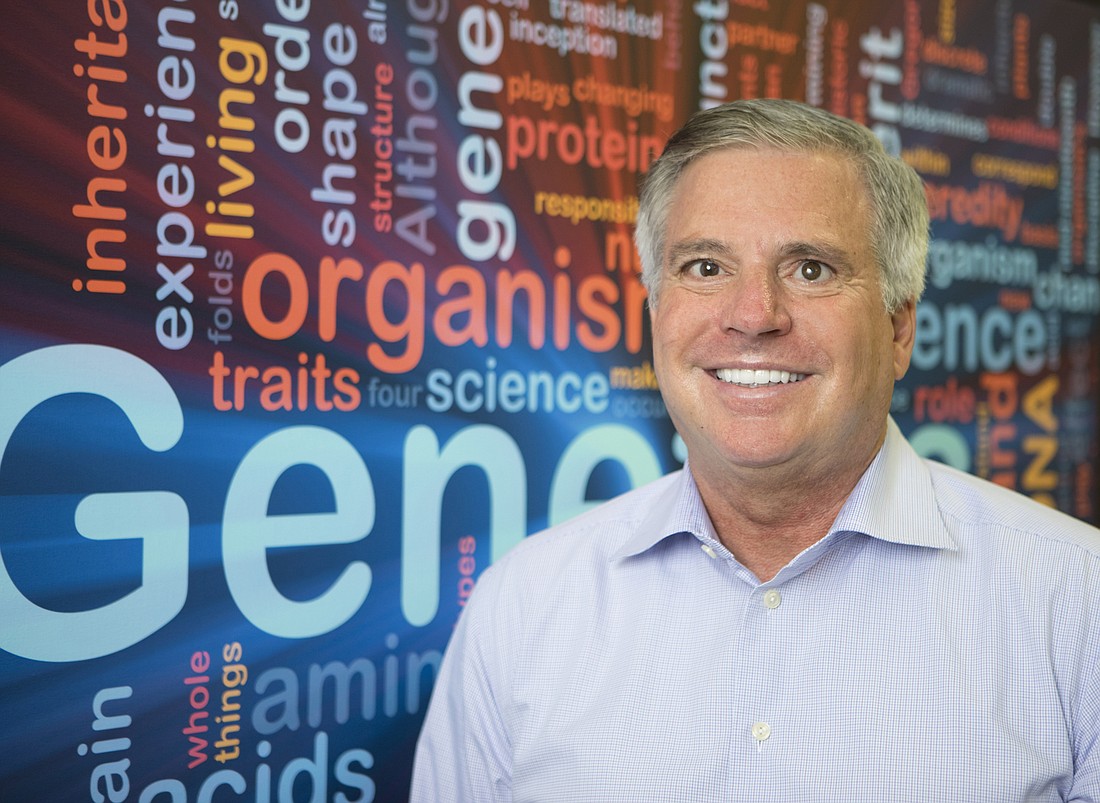- December 13, 2025
-
-
Loading

Loading

Rising demand for clinical genetic testing — brought on by advances in what’s known as precision or personalized medicine, which tailors treatments to suit a person’s unique gene code — has created a niche that St. Petersburg-based InformedDNA is ready to fill.
Founded in 2007 by Tampa clinical geneticist Rebecca Sutphen, the original business model was to be a provider of genetic counseling services to individuals. The firm reinvented its business model in 2013 to focus on working with health insurance companies, which often need outside experts to analyze genetic tests physicians aren’t qualified to examine and interpret for patients.
With that shift came incredible growth and investment — $24 million worth, says David Nixon, an entrepreneur and early-stage seed investor in the privately held company who now is CEO.
“Rebecca started to get some commercial traction but realized it would be helpful to have some management and business experience to complement her deep knowledge of genetics,” Nixon, 53, says. “We took outside capital from a venture capital firm to fund the new vision for the company.”
“Most health plans handle benefit management in-house, but they recognize genetics — and even more broadly, precision medicine — is not something they should be doing on their own.” David Nixon, CEO of InformedDNA
Other capital has come from InformedDNA’s customer base, including an investment from Anthem.
Now that the company is on solid financial footing — Nixon doesn’t disclose revenues but says they were up 57% in 2018 and on track to exceed 100% growth this year — the No. 1 priority is to convince health plan providers to continue to outsource genetic test needs instead of handling that work internally.
“For several of our recent new customers, like a large Blue Cross Blue Shield plan in the mid-Atlantic region, we represent the first time they’ve outsourced anything in more than a decade,” Nixon says. “Most health plans handle benefit management in-house, but they recognize genetics — and even more broadly, precision medicine — is not something they should be doing on their own.”
Shifting from plan participants to the payers themselves has been a boon for InformedDNA, Nixon says. The company makes money like any other provider of managed-care medical services — by billing insurance companies. The result is steady business getting steadier — and more lucrative — because InformedDNA was first to market, Nixon says.
“We’ve only scratched the surface,” he says. “As entrepreneurs, we were probably a little early to the market. So we’re now in a position where one of the reasons we're getting phenomenal growth is the market is finally catching up to us and realizing, ‘Oh, those guys were right. We should pay attention to this.’”
InformedDNA’s rapid interpretation of genetic test results — what it terms “decision support” — has also made the firm a valuable partner for medical specialists, particularly oncologists, to hold onto patients instead of referring them to a cancer institute like Moffitt Cancer Center in Tampa.
“There are already 80,000 genetic tests on the market, and hundreds more come to market every month,” Nixon says. “Physicians can't keep up with the science. And so they are looking for experts to help them. You don’t want to refer out your patient because you might never see them again. Once they get genetic services elsewhere, they’re going to stay in that ecosystem.”
He adds, “We don’t like to think of health care as a business, but if you’re an oncologist, you don’t want to refer your patient to your competitor.”
InformedDNA’s momentum has also helped it attract precious resources: experienced, board-certified geneticists and genetic counselors. Nixon says half the firm’s C-suite, including its chief innovation officer, is made up of trained genetics experts who have also demonstrated “tremendous business acumen.” The company has 135 full-time employees, 80 of which are geneticists or genetic counselors who work remotely.
“We have the largest team of genetic specialists in the country covering all subspecialties: cardiology, oncology, pediatrics, rare diseases,” he says. “And we back them up with a database where we’ve curated all known knowledge of the human genome into usable information.”
One potential obstacle? Nixon says insurers could establish in-house interpretive services similar to InformedDNA, though the complexity, critical importance and cost of genetic tests — as much as $25,000 — means the risk of that occurring is low.
“Important downstream medical decisions — about surgeries, about expensive drugs — are informed by accurate information,” he says. "So the health plans have to make sure genetic testing is done right.”
(This story has been updated to correct the usage of InformedDNA's company name.)